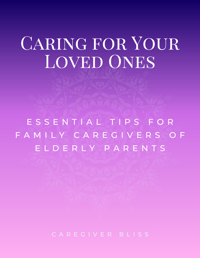Family caregiving is an act of love and devotion, but it can also be emotionally challenging. Whether you've cared for a parent, grandparent, or another family member, it's a demanding responsibility that often takes a toll on your physical, emotional, and mental well-being.
When the time comes to step back from caregiving, it's natural to feel a complex mix of emotions, including guilt. In this article, we will explore why you might feel guilty and offer some strategies to help you let go of that guilt.
Understanding Caregiver Guilt
Caregiver guilt is a common and natural emotional response when you stop providing care for a family member. You may find yourself wondering if you did enough, if you could have done more, or if you should have continued caregiving. It's essential to recognize that guilt is a part of the grieving process, and it often arises from a deep sense of responsibility and love for your loved one.
Reasons for Feeling Guilty
- Unresolved Feelings: Many caregivers feel guilty because they may not have had the opportunity to resolve certain issues or conflicts with their loved one before they passed away or moved to a different care setting.
- Worry About Quality of Care: You might be concerned that the care provided by others will not be as good as the care you gave. This concern is natural, as no one can care for your loved one quite like you.
- The "Should-Have-Done-More" Syndrome: Caregivers tend to be very hard on themselves, often feeling like they should have done more or been more patient. It's important to remember that caregiving can be an overwhelming and exhausting task.
Strategies to Let Go of Caregiver Guilt
- Reflect and Accept: Start by reflecting on your caregiving journey and acknowledge that you did your best given the circumstances. Remember that caregiving is a challenging role, and there are limits to what one person can do.
- Seek Support: Don't hesitate to reach out to friends, family, or a therapist to talk about your feelings of guilt. They can provide valuable emotional support and offer a fresh perspective on your situation.
- Set Realistic Expectations: Understand that no one is perfect, and it's okay to take a step back when it's in the best interest of both you and your loved one. The goal is to provide the best possible care, even if that means getting help from others.
- Focus on Self-Care: Now that you've taken a step back from caregiving, use this opportunity to prioritize your own well-being. Engage in self-care activities, such as exercise, meditation, and hobbies, to help reduce stress and anxiety.
- Celebrate Your Caregiving Journey: Instead of dwelling on what you could have done differently, celebrate the moments when you made a positive impact on your loved one's life. Remember the love and care you provided throughout your journey.
Conclusion
Letting go of guilt after stopping family caregiving is a process that takes time and self-compassion. It's important to remember that you are not alone in feeling this way, and it's okay to seek help and support. The most important thing is to recognize that your caregiving journey was an act of love and selflessness. It's natural to have mixed emotions, but with time, reflection, and support, you can learn to let go of guilt and focus on healing and moving forward in your own life.
We'd love to hear from you! Share your own experiences and insights on letting go of guilt after stopping family caregiving in the comments below. Your words can offer comfort and inspiration to others facing similar challenges, and together, we can build a supportive community of caregivers who have transitioned into new chapters of their lives. So, don't hesitate to join the conversation now!
Free Guide:
Caring For Your Loved Ones
 Attention family caregivers! Are you struggling to provide the best care for your aging parents? Don't worry, we've got you covered.
Attention family caregivers! Are you struggling to provide the best care for your aging parents? Don't worry, we've got you covered.
Download our free guide, Caring for Your Loved Ones: 10 Essential Tips for Family Caregivers of Elderly Parents, and unlock the secrets to becoming an exceptional caregiver.
From adapting the home environment to promoting independence, this invaluable resource will transform your caregiving experience into a more rewarding journey. Don't wait—give your loved ones the care they deserve, and download your free copy today!

